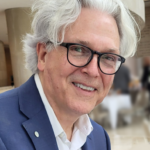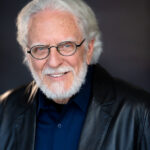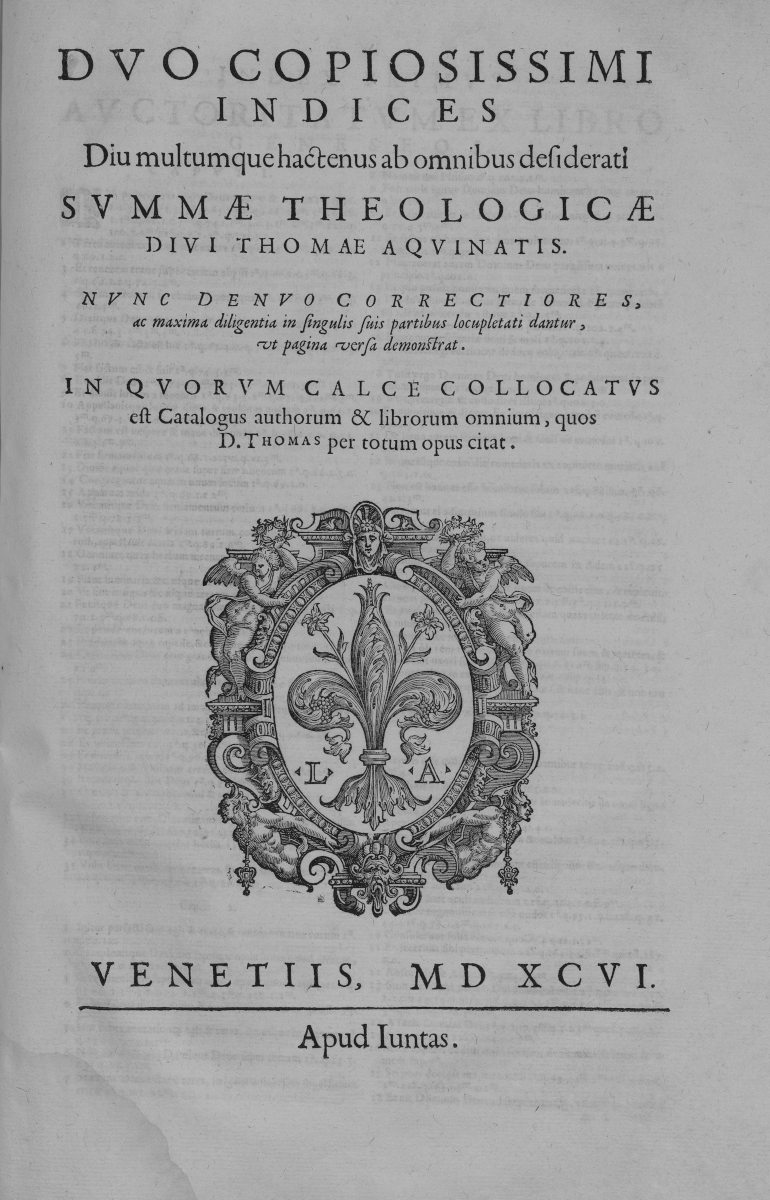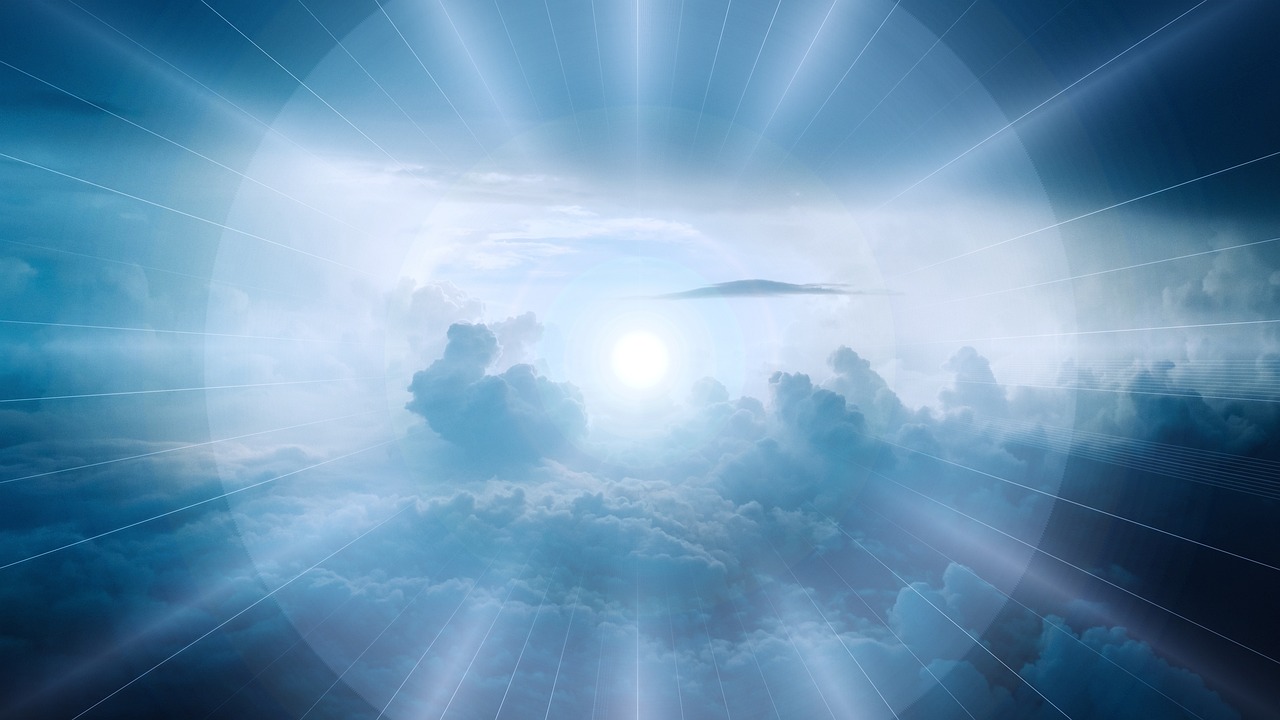Journal – May 2024
Download the PDF
|
In This Issue
|
|
Richard Jernigan, USA  In every study group I’ve attended over the years conjecture invariably enters our discussions. Some of it is wild speculation; other comments are more thoughtfully informed. In this issue of Journal we feature two interesting propositions. David Kantor, who has been working on a documentary focused on Christianity and The Urantia Book, speculates on the role of Christian philosopher Thomas Aquinas’ 13th century Summa Theologica as possible groundwork for the fifth epochal revelation. James Woodward gives us a detailed analysis of that allusive word “morontia,” and why it was necessary for the revelators to invent a new term to embrace a new concept more adequately.
In every study group I’ve attended over the years conjecture invariably enters our discussions. Some of it is wild speculation; other comments are more thoughtfully informed. In this issue of Journal we feature two interesting propositions. David Kantor, who has been working on a documentary focused on Christianity and The Urantia Book, speculates on the role of Christian philosopher Thomas Aquinas’ 13th century Summa Theologica as possible groundwork for the fifth epochal revelation. James Woodward gives us a detailed analysis of that allusive word “morontia,” and why it was necessary for the revelators to invent a new term to embrace a new concept more adequately.
Also, in this issue Mark Blackham explores the idea that the celestial personalities far above us sometimes find themselves at odds with one another. In his article “Dealing With Conflict In A Spiritual Life,” Mr. Blackham observes that disagreement in the heavenly realms is not unusual, particularly at the system, constellation, and local universe levels. He delineates the multiple beings whose role it is to mediate and reconcile the problems arising in creating and managing our grand universe.
Bringing us back to how our celestial friends do guide and enlighten us with new truths, Richard E. Warren provides a three-part study on “Truth, Beauty, and Goodness and the Father,” and how those three supreme values inform and help us develop our relationship with God.
We hope you enjoy these articles as much as we did as they crossed our screens.
Incidentally, this issue also marks my initial foray as Chief Editor of the Urantia Association International Journal. Mark Blackham has done a spectacular job as Chief Editor, having stood on the shoulders of Suzanne Kelly, Kathleen Swadling, Seppo Kanerva, and others (Seppo edited two of my articles back in the 1990’s). I cannot thank Mark enough for his kind, patient, and wise guidance as he hands me the wheel and pursues other projects that will support this great gift we call The Urantia Book. I also thank Myra Hight and James Woodward for their untiring support, insight, and good cheer. I’ve made new friends and gotten to know others better.
As your new Chief Editor, I have a couple of items to offer further engagement to readers. First, beginning with the November 2024 issue we will begin publishing reader comments. We want to hear from you and give you an opportunity to share your thoughts and reactions to the articles we publish. To submit a letter to the editor, please see About the Journal.
The other item to announce is a special edition of Journal to be published in September on the topic of “Government, Politics, and The Urantia Book.” Articles will be non-partisan and will delve into the rich content The Urantia Book offers us on this timely subject. We have several writers at work on this and if you are interested in more information on submissions, please contact me at richardjernigan@urantia-association.org.
Happy reading.
|
|
David Kantor, USA  Curiosity, rumors, second-hand recollections, and imaginative speculation continue to fuel interest in a topic of widespread interest—How The Urantia Book came into existence. While the true story likely never will be known by humans simply because it involves things beyond our comprehension, it’s possible to amuse ourselves by creating a plausible story from these suppositions as they combine with information taken from The Urantia Book and the history of Christianity. So, consider the following as mere speculation.
Curiosity, rumors, second-hand recollections, and imaginative speculation continue to fuel interest in a topic of widespread interest—How The Urantia Book came into existence. While the true story likely never will be known by humans simply because it involves things beyond our comprehension, it’s possible to amuse ourselves by creating a plausible story from these suppositions as they combine with information taken from The Urantia Book and the history of Christianity. So, consider the following as mere speculation.
Emma Christensen, the last of the Contact Commissioners, told me that work on the revelation began in the Middle Ages. Other apocryphal sources specify the 1200s. From comments in The Urantia Book, we can reasonably assume that Machiventa was present on the planet in the capacity of Resident Governor General sometime in the High Middle Ages. This period, particularly in the 12th century, saw a widespread spiritual awakening across Europe. It was the apex of Christian civilization. There was a desire to know more about Jesus and how to live a Christ-like life (see references below).
The problem was that, with the sketchy biblical account, a Christ-like life meant poverty, suffering, caring for the downtrodden, rejection of material reality, and itinerant preaching. Dissident sects seeking an elevated understanding of Jesus and the Incarnation did so by exploiting older mysticism and personal revelations of various leaders. The result of this sincere seeking was increasing confusion. The Catholic Church leadership was furious. One dissident sect, the Cathars, seeking to live according to their understanding of the life and teachings of Jesus, saw between 200,000 and 1,000,000 of their followers killed by the Church in the 1200s. Given this situation, we can appreciate the midwayers petitioning for permission to produce a comprehensive review of the Incarnation, a full story of the life and teachings of Jesus.
We can imagine this petition being prepared for Machiventa, our vicegerent Planetary Prince, and given to him during his sojourn here as Resident Governor General. This petition subsequently not only reached Uversa, but the response came in the form of a mandate issued by the Ancients of Days to create The Urantia Book.
Emma Christensen also said that when the revelators commented on the Middle Ages origin of the effort, one of the Contact Commissioners asked why it took so long, but the question went unanswered.
So let’s ask the question again, just why could it have taken so long?
The Urantia Book provides a couple of clues. Right off the bat, the revelators bemoan being restricted to the use of our circumscribed language when attempting to communicate enlarged concepts and advanced truth (0:2.2). In another section, a Melchizedek laments the difficulties of perpetuating truth in early times (93:7.4). (In the 12 century, Gutenberg's printing revolution was still two centuries in the future). And there are other comments in the book such as, “cannot find suitable words,” “paucity of language,” and “I will endeavor to depict.” Each of these comments helps us to appreciate the challenges and limitations of primitive language on a primitive planet.
 In the 12th century, language would have been an even greater issue than it was in the early 20th century. At this time, there were hundreds of dialects spoken throughout Europe. The primary vernaculars of Europe that we know of today did not coalesce until after Gutenberg. The English language itself was still evolving from Anglo-Saxon, Germanic, and Old Norse dialects.
In the 12th century, language would have been an even greater issue than it was in the early 20th century. At this time, there were hundreds of dialects spoken throughout Europe. The primary vernaculars of Europe that we know of today did not coalesce until after Gutenberg. The English language itself was still evolving from Anglo-Saxon, Germanic, and Old Norse dialects.
If the revelation was going to be viable, it would have to be constructed upon concepts which had been formulated by human minds. So, there’s the problem of culling through all the cultures, dialects, and vernaculars of the High Middle Ages to find concepts which might be used to meet the directives of the Uversa mandate.
Here's where our skeleton of speculation begins to acquire a mantle of reality. Thomas Aquinas was a Dominican friar teaching theology and philosophy at the University of Paris. Perhaps the greatest religious genius of the Christian epoch, he wrote Summa Theologica—the summation of theological knowledge—between 1266 and 1273.
In it, Aquinas posed 512 questions about the nature of reality, covering the full range of categories of interest at the time. Here’s a basic outline of his work:
- Existence and the Nature of God
- The Trinity
- Angels
- Ethics and Moral Philosophy
- Law and Grace
- Spiritual Values
- The Incarnation, Life and Teachings of Jesus
- Sacraments and the Church
- Eschatology (The ultimate destiny of individuals, humanity, and the world)
 In the Summa, each question is followed by a sequence of answers, each taken from a Hebrew, Islamic, Christian, or Pagan source, which are followed by Aquinas’ own answer conditioned by his personal beliefs and integrated with Aristotle’s natural philosophy. The sequence of answers for each question is then complemented by a collection of articles related to the question-articles taken from the widespread cross-cultural scientific and academic writings of the time. A total of 3,125 individual articles are thusly incorporated into the Summa. It’s a stunning work of scholarship.
In the Summa, each question is followed by a sequence of answers, each taken from a Hebrew, Islamic, Christian, or Pagan source, which are followed by Aquinas’ own answer conditioned by his personal beliefs and integrated with Aristotle’s natural philosophy. The sequence of answers for each question is then complemented by a collection of articles related to the question-articles taken from the widespread cross-cultural scientific and academic writings of the time. A total of 3,125 individual articles are thusly incorporated into the Summa. It’s a stunning work of scholarship.
Here's the point: Thomas Aquinas’ Summa Theologica was the first significant cosmology to appear in Christendom since Augustine’s City of God, written a millennium earlier. Not only did the Summa provide a summary of widely scattered 13th century cosmological concepts, but by its very nature, it also provided a summary of the residual Melchizedek teachings, at least as they were known in the West and the Near East. In addition, the entire work, including copies and summaries of articles, were all in the same language—Latin.
So there you have it: A conceptual foundation upon which we can reasonably conjecture that The Urantia Book was constructed.
But there’s more to our question about why it took so long.
There were a great number of evolving social, political, linguistic, technological, and religious variables which had to enter the seraphic projections for the optimal time to make a soft landing of the revelation in the mortal milieu. In addition to the linguistic concerns, there were technological issues. Printing presses were in use 200 years before Gutenberg but they used characters carved from wood or made from ceramic materials. Gutenberg, a metallurgist who specialized in manufacturing mirrors used to reflect holy light from icons, developed an alloy for making molds that wouldn’t melt when molten metal was poured into them for casting. It was his metal movable-type that transformed printing. Reusable type quickly came into widespread use and the cost of printing fell by 93%. The first book fairs were held and networks of booksellers began to evolve.
|
|
James Woodward, USA  Definitions
Definitions
Though it may be premature to forecast wide acceptance of The Urantia Book, it’s clearly rising in visibility due to decades of wise dissemination efforts and, of course, the internet. The first page of the Foreword, however, carries four statements calling attention to the serious problem of confusion on Urantia. We are notified—and warned—that progress on our world will depend on the evolution of human wisdom and revelation. Our own community of reader / believers is also confused about certain terms and definitions found in the teachings. We ought to resolve this confusion among Urantia Book devotees as we continue to take the advanced messages out into the mainstream. It is in that spirit that I advance my personal theory: morontia is akin to supermorality.
Evolving mortal creatures experience an irresistible urge to symbolize their finite concepts of God. Man’s consciousness of moral duty and his spiritual idealism represent a value level—an experiential reality—which is difficult of symbolization. 0:2.1 (3.14) [all bold indicates author’s emphasis]
 We are offered here an early hint of the big news the authors will expand on throughout the book. Due to their difficulty in using human language, they invent a new word-symbol to describe that value level: morontia, a previously unrevealed reality “between the material and spiritual levels of creature existence.” (541.4)
We are offered here an early hint of the big news the authors will expand on throughout the book. Due to their difficulty in using human language, they invent a new word-symbol to describe that value level: morontia, a previously unrevealed reality “between the material and spiritual levels of creature existence.” (541.4)
The term morontia and its various forms are much used in the book. Despite over 800 references and many detailed revelations, some of our understanding remains unclear, the meaning even misunderstood. Respected Urantia Book teachers have rendered astute opinions, mostly based on etymology. Because the word conveys a dual meaning the lack of consensus is understandable. But the revelators, as always, are clear on what they intend; they present definitive meanings in context, spread across many papers and pages.
First a note: There is meaning in our etymology of morontia, but we should not attempt to define this complex term solely upon the origin / meaning of human words. That results in a monocular understanding. We are reminded that the upgrade to morontia mind brings a stereoscopic perspective: “Mota is more than a superior philosophy; it is to philosophy as two eyes are to one; it has a stereoscopic effect on meanings and values” (554.2). The stereo meaning of morontia is fully revealed via etymology and revelation context. Language is important. The Urantia Book’s stunning revelations could not be given until the human intellect became cosmically teachable. And then, to impart advanced truths, human words were carefully selected—some redefined, some new ones invented. We grow intellectually and spiritually by adopting the narrator’s use of language and meanings, especially when they weave coined terminology with our best words in order to enlighten us.
Most morontia references refer to semi-physical realities, but it’s a multi-faceted word symbol; like a polished crystal it reveals vibrant colors when we gaze upon it. Regarding the mind and soul of man, the link between morality and morontia cannot be overlooked. Witness the cosmic magnitude of the birth of one’s soul—a new personal reality and the baptism into morontia life, triggered by our first moral choice. Morals and morality—and morontia—are woven into very meaningful teachings: “The soul of man cannot exist apart from moral thinking and spiritual activity” (1478.4). We are taught that the soul is a morontia reality and this is a clear connection to morality. Our morontia career is devoted to acquiring wisdom: “and since wisdom is superknowledge” (1776.1), and mota is: “superphilosophic sensitivity” (1121.4), this suggests supermorality: the essence of the cosmic teaching of fact, meaning, and value; truth, beauty, and goodness, etc. This thesis proposes that morontia, when not referring to semi-physical realities, denotes supermorality (my word), synonymous with postmoral, an interesting “once word” we shall visit.
Supermorality may be associated with mota in the stereoscopic and superadditive sense of combining elements (superknowledge and superphilosohy) to achieve nonpredictable outcomes. Maybe that is why an Archangel informs us, “The higher levels of mota join directly with the higher levels of human philosophy” (556.1). The author, however, was not permitted to share “the full mota” but only the human parallels; not “the higher levels of cosmic insight and morontia mota” (557.15). Only the experience of death can fully prepare us for some things.
An analysis of morontia by etymology connects the ‘mor’ to moral (as the book clearly does); the ‘ont’ may be connected to ontology or being / existence. The ‘ia’ or ‘tia’ creates a noun, which can be a person, place, thing, or idea, but in Urantia Book nomenclature our task is complicated because the suffix is also used for a newly revealed reality. Etymology leads us into the word salad, even sustains illusions as in linking morontia with moron, but context throughout the text gives the cosmic meaning our teachers wish to convey. Our understanding about morontia must perforce be that it describes both an advanced semi-material reality and an advanced sensitivity in our mind arena (e.g. superphilosophic, see 1121.4). We are informed about morontia bodies and structures on next-life worlds, as well as a progressive level of mind that fully encircuits us post-Urantia. We are also informed that morontia mind—thinking above the human level—can be achieved during our first life, that in fact we become “morontia newborns” with our first moral choice. The degree of reality difference between material and morontial could be compared to, say, larvae and butterflies.
Morality and Morontia
The most straightforward links between moral and morontia are:
Moral will embraces decisions based on reasoned knowledge, augmented by wisdom, and sanctioned by religious faith. Such choices are acts of moral nature and evidence the existence of moral personality, the forerunner of morontia personality and eventually of true spirit status. 101.5 (1111.7)
Morality is the essential pre-existent soil of personal God-consciousness, the personal realization of the Adjuster's inner presence, but such morality is not the source of religious experience and the resultant spiritual insight. The moral nature is superanimal but subspiritual. Morality is equivalent to the recognition of duty, the realization of the existence of right and wrong. The moral zone intervenes between the animal and the human types of mind as morontia functions between the material and the spiritual spheres of personality attainment. 196.3 (2096.1)
These statements are very concise; etymology can be interpretive, but context states the case clearly. Here’s another link between moral and morontia:
And then, climax all of these procedures of multisocialization with the concurrent enhancement of spiritual insight as it pertains to the augmentation of all phases of personal endowment through group spiritual association and morontia co-ordination. Intellectually, socially, and spiritually two moral creatures do not merely double their personal potentials of universe achievement by partnership technique; they more nearly quadruple their attainment and accomplishment possibilities. 43.8 (494.10)
One of the grand concepts of the fifth revelation is spiritual insight, the invaluable technique by which we perceive supermeanings and supervalues. Sometimes our teachers use the technique of “defining by dash.” This reference defines spiritual insight with dashes, further illuminating the deep significance of morality:
Moral evaluation with a religious meaning—spiritual insight—connotes the individual’s choice between good and evil, truth and error, material and spiritual, human and divine, time and eternity. 196.3 (2095.1)
Personal moral discernment as to spiritual ideals not only triggers the birth of our morontia soul, but according to the above quote, it may also elevate us to divinity and into eternity.
Here is another teaching where the revelators expand definitions to include moral thinking, morontia existence, and supermortal function on post-Urantia worlds. The earlier citation already affirms that our moral nature is superanimal. They continue to establish the link between moral and morontia:
You should understand that the morontia life of an ascending mortal is really initiated on the inhabited worlds at the conception of the soul, at that moment when the creature mind of moral status is indwelt by the spirit Adjuster. And from that moment on, the mortal soul has potential capacity for supermortal function, even for recognition on the higher levels of the morontia spheres of the local universe. 48.6 (551.7)
The following quotations further establish the connection between morality and morontia:
 True religion is that sublime and profound conviction within the soul which compellingly admonishes man that it would be wrong for him not to believe in those morontial realities which constitute his highest ethical and moral concepts, his highest interpretation of life's greatest values and the universe's deepest realities. And such a religion is simply the experience of yielding intellectual loyalty to the highest dictates of spiritual consciousness. 101.9 (1115.4)
True religion is that sublime and profound conviction within the soul which compellingly admonishes man that it would be wrong for him not to believe in those morontial realities which constitute his highest ethical and moral concepts, his highest interpretation of life's greatest values and the universe's deepest realities. And such a religion is simply the experience of yielding intellectual loyalty to the highest dictates of spiritual consciousness. 101.9 (1115.4)
Moral consciousness is just a name applied to the human recognition and awareness of those ethical and emerging morontial values which duty demands that man shall abide by in the day-by-day control and guidance of conduct. 101.9 (1115.6)
Faith becomes the connection between moral consciousness and the spiritual concept of enduring reality. Religion becomes the avenue of man's escape from the material limitations of the temporal and natural world to the supernal realities of the eternal and spiritual world by and through the technique of salvation, the progressive morontia transformation. 101.9 (1116.1)
The revelators cleverly draw our attention to the moral / morontia connection with two passages far removed from each other, emphasizing the need to study the entire revelation. They trade on a popular human term so we can better understand the root of their new word:
I may inform you that on Uversa we teach forty-eight reasons for permitting evil to run the full course of its own moral bankruptcy and spiritual extinction. 45.5 (618.3)
Spiritual (soul) death. If and when mortal man has finally rejected survival, when he has been pronounced spiritually insolvent, morontially bankrupt… thereupon do the rulers of Orvonton order the immediate release of the indwelling Monitor. 112.3 (1229.9)
The sly juxtaposition is intentional. They are familiar with our idiom and a key teaching is further expanded; morality (morontia) is central to both soul birth and soul death!
Here is an interesting “once-word,” a single use in the text. Though morontia is not specifically mentioned it can be inferred, tied to an enlightened definition of religion:
Religion is not grounded in the facts of science, the obligations of society, the assumptions of philosophy, or the implied duties of morality. Religion is an independent realm of human response to life situations and is unfailingly exhibited at all stages of human development which are postmoral. 5.5 (68.5)
The morontia state is postmoral. Righteousness, ethics, virtue, and morality are all related in Urantia Book teachings, though not interchangeably. But here is an example that supports this notion:
The co-ordination of idea-decisions, logical ideals, and divine truth constitutes the possession of a righteous character, the prerequisite for mortal admission to the ever-expanding and increasingly spiritual realities of the morontia worlds. 101.6 (1112.3)
The following key passage doubles down on the foundational importance of morality, a reality level described as duty, along with the other two innate cosmic intuitions of causation and worship:
Intelligence alone cannot explain the moral nature. Morality, virtue, is indigenous to human personality. Moral intuition, the realization of duty, is a component of human mind endowment and is associated with the other inalienables of human nature: scientific curiosity and spiritual insight. Man’s mentality far transcends that of his animal cousins, but it is his moral and religious natures that especially distinguish him from the animal world. 16.7 (192.8)
The following passages suggest that the most recent revelation “unfailingly expands” on the moral obligations of earlier revelations—the new concept of morontia is not merely morality expanded—it qualifies as cosmic morality. Also, the Supreme is added to the morality mix:
Joyful acceptance of cosmic citizenship—honest recognition of your progressive obligations to the Supreme Being, awareness of the interdependence of evolutionary man and evolving Deity. This is the birth of cosmic morality and the dawning realization of universal duty. 110.3 (1206.8)
No professed revelation of religion could be regarded as authentic if it failed to recognize the duty demands of ethical obligation which had been created and fostered by preceding evolutionary religion. Revelation unfailingly enlarges the ethical horizon of evolved religion while it simultaneously and unfailingly expands the moral obligations of all prior revelations. 101.9 (1115.2)
The temporal relation of man to the Supreme is the foundation for cosmic morality, the universal sensitivity to, and acceptance of, duty. This is a morality which transcends the temporal sense of relative right and wrong; it is a morality directly predicated on the self-conscious creature’s appreciation of experiential obligation to experiential Deity. 117.4 (1284.4)
Human morality may recognize values, but only religion can conserve, exalt, and spiritualize such values. But notwithstanding such actions, religion is something more than emotionalized morality. Religion is to morality as love is to duty, as sonship is to servitude, as essence is to substance. 102.5 (1124.2)
Here is more about the connection, perhaps the synthesis, of morality and our relationship with the indwelling Adjuster (Father), the cosmic mind bestowed by Mother, and the moral character of the Creator Son:
Moral evolution is not wholly dependent on revelation. High moral concepts can be derived from man’s own experience. Man can even evolve spiritual values and derive cosmic insight from his personal experiential living because a divine spirit indwells him. 95.3 (1045.5)
Material evolution has provided you a life machine, your body; the Father himself has endowed you with the purest spirit reality known in the universe, your Thought Adjuster. But into your hands, subject to your own decisions, has been given mind, and it is by mind that you live or die. It is within this mind and with this mind that you make those moral decisions which enable you to achieve Adjusterlikeness, and that is Godlikeness. 111.1 (1216.5)
Moral self-consciousness is true human self-realization and constitutes the foundation of the human soul, and the soul is that part of man which represents the potential survival value of human experience. Moral choice and spiritual attainment, the ability to know God and the urge to be like him, are the characteristics of the soul. The soul of man cannot exist apart from moral thinking and spiritual activity. A stagnant soul is a dying soul. But the soul of man is distinct from the divine spirit which dwells within the mind. The divine spirit arrives simultaneously with the first moral activity of the human mind, and that is the occasion of the birth of the soul.
The saving or losing of a soul has to do with whether or not the moral consciousness attains survival status through eternal alliance with its associated immortal spirit endowment. Salvation is the spiritualization of the self-realization of the moral consciousness, which thereby becomes possessed of survival value. All forms of soul conflict consist in the lack of harmony between the moral, or spiritual, self-consciousness and the purely intellectual self-consciousness. 133.6 (1478.4)
The Spirit of Truth is concerned primarily with the revelation of the Father’s spirit nature and the Son’s moral character. 194.3 (2062.10)

The adventure into new discoveries of fact, meaning, and value, are the delight of a truth-seeker’s soul. This exercise was designed to stimulate thinking on a very important topic. When disseminating the advanced teachings of The Urantia Book we ought to be in sync with each other… and with our superhuman teachers.
Note: Recently Urantia Foundation completed its translation of The Urantia Book into Simplified Chinese. According to project leader Richard Zhu, “The translation for “morontia” was indeed very challenging, I didn't use transliteration, instead I followed the methodology revelators used to translate, I picked the Chinese concepts of spirit (属灵) and material (物质) and use a character "灵" from "属灵" and a character "质" from "物质" and form a brand-new concept "灵质" which means a vast level intervening between the material and the spiritual.”
|
|
Mark Blackham, Canada  Conflicts are an inevitable part of life on inhabited worlds, especially those worlds in the earlier stages of social and spiritual evolution. And this is certainly the case at the present stage of development on Urantia.
Conflicts are an inevitable part of life on inhabited worlds, especially those worlds in the earlier stages of social and spiritual evolution. And this is certainly the case at the present stage of development on Urantia.
Things have improved over the centuries and, no doubt, they will continue to improve over time. But not until the distant future, when our planet finally attains the utopian ages of light and life, will we be entirely free of discord. This is not to say that, at such a time, we will all be of the same mind. But the way we deal with our differences will change significantly. Until we reach that utopia, and apart from national wars, we will experience two personal spheres of conflict—one is the conflict that takes place in the inner life (mind and soul), and the other is the conflict that occurs in the outer life (family and social).
Inner Conflict
 Jesus said there are two realms of human life; one is a life in the flesh, and the other is a life in the spirit. Indeed, on his return from Rome, he told Ganid that there are two great classes of mortals—those who know God and those who do not (133:0.3).
Jesus said there are two realms of human life; one is a life in the flesh, and the other is a life in the spirit. Indeed, on his return from Rome, he told Ganid that there are two great classes of mortals—those who know God and those who do not (133:0.3).
He went on to say that people who live completely in the flesh or completely in the spirit, experience little inner conflict, but for all others who struggle to make the transition from one life to the next, there will be a considerable degree of conflict and confusion along the way. And Jesus, rather than telling his disciples to ignore this struggle or to cover it up with false optimism, instead instructed them to be right up front about it.
Forewarn all believers regarding the fringe of conflict which must be traversed by all who pass from the life as it is lived in the flesh to the higher life as it is lived in the spirit. 159:3.7 (1766.3)
When I first read this section of The Urantia Book, I couldn’t help but think it was already difficult enough to spread Jesus’ essential and elementary message—that our spiritual life begins by accepting that we are children of a loving, personal God. But now I'm instructed to tell all prospective believers that their ongoing attempts to attain this spiritual life will entail struggle and conflict. It seems like a hard sell.
Jesus said even more on this subject:
While you will experience great joy in the service of my Father, you should also be prepared for trouble, for I warn you that it will be only through much tribulation that many will enter the kingdom. 137:6.5
The religion of the spirit means effort, struggle, conflict, faith, determination, love, loyalty, and progress. 155:5.11 (1729.6)
If you dare to believe in me and wholeheartedly proceed to follow after me, you shall most certainly, by so doing, enter upon the sure pathway to trouble. 159:3.13 (1767.1)
Our Master makes it clear that we can expect much trouble, tribulation, struggle, and conflict in our ongoing efforts to prosper in the spirit. But that’s not all. We are expected to accept our struggles gladly and to happily perform our obligations to God, family, and society.
The notion that a spiritual life is full of adversity and obligation appears to be a far cry from fashionable views—that somehow a spiritual journey is akin to “a fantastic and mystic experience of indescribable feelings of ecstasy” (101:1.1) or that it’s a mental state of utopian bliss.
Religion is not a technique for attaining a static and blissful peace of mind; it is an impulse for organizing the soul for dynamic service. 100:3.1 (1096.6)
Jesus dispelled other cherished notions about religion. In the Roman Empire of those days, and even today, it was not uncommon for people with faith to believe they were entitled to divine providence or special treatment, or that perhaps, by God’s hand, they would be spared the troubles of others.
Teach all believers that those who enter the kingdom are not thereby rendered immune to the accidents of time or to the ordinary catastrophes of nature. 159:3.13 (1767.1)
So why does Jesus tell us it’s going to be a tough experience? I doubt he’s trying to discourage us. It’s more likely he’s attempting to disillusion us, just as he did with the apostles on many occasions. However, despite his many cautions and reprimands, it’s a great relief that he always gives us an out—he gives us a spiritual reason to stay the course.
Indeed, just after he forewarned all believers about inevitable conflict, he mentions that the “The gospel yoke is easy and the burden of truth is light.” In another paper, a midwayer tells us that “The Master’s yoke is, indeed, easy…” (141:3.7). And in other places Jesus repeats this comforting truth.
Take upon you the divine yoke, and you will experience the peace of God, which passes all understanding.” 144:8.8 (1627.5)
Take my yoke upon you and learn of me, for I am true and loyal, and you shall find spiritual rest for your souls. 163:6.7 (1808.1)
 The Master’s yoke is discovering and living the will of God by means of the truth he speaks and the example he lives. To overcome our difficulties and troubles, we are required only to believe him, to trust him, and to follow him, which is not a heavy burden at all. We are also consoled and heartened when he tells us that, once we believe this gospel, we will be unafraid when trouble strikes, and that he will be there with us through all these tribulations—if we would only believe.
The Master’s yoke is discovering and living the will of God by means of the truth he speaks and the example he lives. To overcome our difficulties and troubles, we are required only to believe him, to trust him, and to follow him, which is not a heavy burden at all. We are also consoled and heartened when he tells us that, once we believe this gospel, we will be unafraid when trouble strikes, and that he will be there with us through all these tribulations—if we would only believe.
There is but one struggle for those who enter the kingdom, and that is to fight the good fight of faith. The believer has only one battle, and that is against doubt—unbelief. 159:3.8 (1766.4)
I do not promise to deliver you from the waters of adversity, but I do promise to go with you through all of them. 159:3.12 (1766.8)
The Benefits of Conflict
There are good reasons for understanding the benefit of inner conflict in a spiritual life. For instance, we discover that, in all our moral dilemmas, simply asking God for help is one path to God-consciousness.
Every human being very early experiences something of a conflict between his self-seeking and his altruistic impulses, and many times the first experience of God-consciousness may be attained as the result of seeking for superhuman help in the task of resolving such moral conflicts. 103:2.4 (1131.3) emphasis added
Throughout our spiritual lives, we cannot avoid growing pains. Our minds and souls do not easily give up the comforts and familiarities of a material and secular existence. But growing in the spirit requires that we leave these comfortable shores for unknown and unexplored lands, a situation that can lead to anxieties and stress.
Religious perplexities are inevitable; there can be no growth without psychic conflict and spiritual agitation. 100:4.2 (1097.6)
Even Jesus experienced these conflicts in his youth:
He [Jesus] was distraught by the conflict between the urge to be loyal to his own convictions and the conscientious admonition of dutiful submission to his parents… 124.4.9 (1372.6)
Another benefit of inner, or moral, conflicts is that they often give rise to spiritual insights, bringing us closer to God and allowing us to reach a better understanding of ourselves and others. Such conflicts induce us to change our way of thinking—to look for a better way of living—to devote our lives to the way of God and, by doing so, to open our minds to even greater spiritual truths.
New religious insights arise out of conflicts which initiate the choosing of new and better reaction habits in the place of older and inferior reaction patterns. New meanings only emerge amid conflict; and conflict persists only in the face of refusal to espouse the higher values connoted in superior meanings. 100:4.1 (1097.5) emphasis added
Another episode in Jesus’ life that was truly inspiring in this regard, was his talk with Fortune, “the young man who was afraid.” He comforts the distraught young man by telling him to free his inner spirit from the fetters of fear so that it can “stimulate and inspire your mind.” He encourages the youth to enable his spiritual nature with “the power-presence of living faith,” an act that leads to the consciousness that “you are a child of God.” And when you are thus born again:
Trouble will invigorate you; disappointment will spur you on; difficulties will challenge you; and obstacles will stimulate you. 130:6.4 (1438.1)
Conflict and trouble are necessary conditions for spiritual growth but, with some incongruity, our ultimate spiritual objective is to overcome all conflict in our inner lives.
All conflict is evil in that it inhibits the creative function of the inner life—it is a species of civil war in the personality. 111:4.11 (1220.10)
As Jesus says, the way to overcome our conflict and thereby reach inner peace, is to accept and believe his words—his gospel. And with the power of our steadfast faith, to follow the spirit within—to live the way of God no matter what trials and tribulations await—even unto death.
But if we cannot fully attain this peace of mind on earth, we are assured that we will have the opportunity to achieve it when we reach the second mansion world.
Mansonia number two more specifically provides for the removal of all phases of intellectual conflict and for the cure of all varieties of mental disharmony. 47:4.8 (535.4)
Social Conflict
No matter how much we personally advance in the spirit and resolve our inner conflicts, we can never entirely avoid social conflicts. Even Jesus, as a perfect man, could not avoid all social misunderstandings, regardless that the onus of these misunderstandings inevitably fell on others.
Jesus advised us to be tactful and tolerant with everyone, to be alert and expert in our “worthy efforts to avoid all unnecessary social misunderstandings.”
Such wise souls are able to avoid much of the trouble which is certain to be the portion of all who suffer from lack of emotional adjustment, those who refuse to grow up, and those who refuse to grow old gracefully. 156:5.18 (1740.5)
We are all different in so many ways, which inevitably leads to differences of opinion and, therefore, the need to be tolerant. And tolerance comes more easily once we understand the truth of our relationships with one another. As Jesus told James:
“You do not have to see alike or feel alike or even think alike in order spiritually to be alike. Spiritual unity is derived from the consciousness that each of you is indwelt, and increasingly dominated, by the spirit gift of the heavenly Father.(141:5.1).
Spiritual unity is achieved by our individual recognition of the divine spirit living within all of us, followed by our respect for the spirit presence in others. Unfortunately, at the present stage of social development on Urantia, spiritual unity in the service of God seems a long way off. In the meantime, we can only do our best to live the spirit way while having great faith in “the exceedingly great and precious promises of God.”

And regardless of the doings of others, it remains our objective and our duty to learn to live harmoniously with all kinds of people. This skill begins on earth and continues through the mansion worlds, even to the constellations and beyond.
One of the most important lessons to be learned during your mortal career is teamwork. 28:5.14 (312.1)
Learning teamwork is a long-term objective. The Urantia Book makes it clear that, even after we have graduated from Jerusem and achieved Adjuster fusion, we have yet to fully overcome our social irritabilities and resentments. Overcoming these irritabilities is one of our main objectives on the constellation worlds, a goal attained through our experience of living with the univitatia and others. Ultimately, it teaches us to “live happily and work effectively” with many different types of beings (43:8).
World Conflict
There can be little doubt that world conflict and wars will continue for some time. It is revealed to us that there can be no true peace on Urantia until such time as we establish world government. That too, seems a long way off.
World peace cannot be maintained by treaties, diplomacy, foreign policies, alliances, balances of power, or any other type of makeshift juggling with the sovereignties of nationalism. World law must come into being and must be enforced by world government—the sovereignty of all mankind. 134:6.9 (1491.3)
How long will this ongoing state of world conflict persist? The only clue we are given is from this quote:
Mechanical inventions and the dissemination of knowledge are modifying civilization; certain economic adjustments and social changes are imperative if cultural disaster is to be avoided. This new and oncoming social order will not settle down complacently for a millennium. 99:1.1 (1086.4) emphasis added
Although this statement was made almost 100 years ago, it seems much more relevant today. The rapid pace of invention and the worldwide spread of knowledge (some of it questionable) have irreversibly altered the operation of society. Indeed, it appears to be a time for necessary “economic adjustments and social changes.”
It is also made clear in Paper 195 that the root cause of much of the grief on our planet is due to the secularization of thought and the adoption of materialist philosophies.
The complete secularization of science, education, industry, and society can lead only to disaster. During the first third of the twentieth century Urantians killed more human beings than were killed during the whole of the Christian dispensation up to that time. And this is only the beginning of the dire harvest of materialism and secularism; still more terrible destruction is yet to come. 195:8.13 (2082.5)
Keep in mind, this statement was made after the First World War but before the Second. Whether or not this “terrible destruction” will continue in the 21st century remains to be seen. But of one thing we can be sure:
Without God, neither freedom and liberty, nor property and wealth will lead to peace. 195:8:12 (2082.4)
Despite all the doom and gloom, there can be little doubt the world has never been better off. And this is true no matter which economic or social category we wish to measure (see Hans Rosling, Factfulness: Ten Reasons We’re Wrong About the World—and Why Things Are Better Than You Think, 2018). Rosling attributes much of world grief to the short attention span of the individual as well as the inherent “negativity instinct” of mankind, a foreboding mental state that becomes a self-fulfilling prophecy. He says it is important to appreciate the achievements of world civilization while also recognizing that things can be much better yet.
Without world peace, you can forget about all other global progress. – Hans Rosling
Things will get better, but just as conflict is conducive to spiritual growth at the individual level, it can also pertain to the spiritual progress of world civilization.
… Jesus referred one phase of the kingdom to the future and did, on numerous occasions, intimate that such an event might appear as a part of a world crisis… 170:4.15 (1863.13) emphasis added
Despite all this turmoil, and despite the perpetual end-of-the-world scenarios and dark dystopias that appear to get much currency in the media, we are told time and again to have faith in the words of Jesus.
Be not discouraged; human evolution is still in progress, and the revelation of God to the world, in and through Jesus, shall not fail. 196:3.33 (2097.1)
Universe Conflict
Conflicts, disagreements, and misunderstandings between different individuals do not end on the mansion worlds, nor are they limited to mortal ascenders. No doubt, the troubles occurring in universe affairs are of a nature unknown to us, but even the master seraphim involved in the planetary government of Urantia (114:6.17) have had their disagreements—and they’ve been to Paradise and back!
And this fact alone speaks highly to the notion that there is nothing wrong about voicing our disagreements. The significant difference is how we deal with them. As the renowned American basketball coach, John Wooden once said, “We can agree to disagree, but we don’t need to be disagreeable."
The disagreements and troubles in the administration of a universe are “very unlike the petty trials and travails of material existence” and instead appear to be more related to misunderstandings.
The moment the Creators bring into existence evolving individuals with the power of choice, that moment a departure is made from the smooth working of divine perfection; misunderstandings are certain to arise, and provision for the fair adjustment of these honest differences of viewpoint must be made. 25:3.7 (277.4)
The Universal Conciliators serve as the traveling courts of the worlds, functioning from the individual planets to the superuniverse headquarters (25:3). Their job is to adjudicate the minor difficulties and misunderstandings of the realms. Some of these difficulties relate to proper procedure, while others result from differences of opinion or different viewpoints.
But in the sector governments and on higher spiritual levels, there are fewer misunderstandings to adjudicate, and their work takes on a different nature. Nonetheless, to get some idea of the number of misunderstandings arising in a superuniverse, consider that there are almost eighteen trillion Conciliator commissions in Orvonton alone.
The courts and tribunals of the universes also adjudicate misunderstandings, poor judgment, or minor errors, although real conflict still occurs. On Urantia, the most familiar celestial conflict would be the Lucifer rebellion, but there have been others in the local universe of Nebadon and probably quite a few in the entire seven superuniverses.
This war in heaven was very terrible and very real. While displaying none of the barbarities so characteristic of physical warfare on the immature worlds, this conflict was far more deadly; material life is in jeopardy in material combat, but the war in heaven was fought in terms of life eternal. 53:5.7 (606.3)
Conflicts such as these appear to be confined to the local system level, and specifically to the order of Landonadek Sons. While some Melchizedek Sons have had lapses of judgment and the Vorondadek Sons of the constellations have erred occasionally, they have never fallen to rebellion, nor have they ever been found in contempt of the universe government.
Nevertheless, there appears to be a considerable amount of discord throughout these lower levels of superuniverse administration. And there is no better proof of this than the existence of the Mighty Messengers.
Mighty Messengers… are a class of perfected mortals who have been rebellion tested or otherwise equally proved as to their personal loyalty; all have passed through some definite test of universe allegiance. At some time in their Paradise ascent they stood firm and loyal in the face of the disloyalty of their superiors…. 22:2.1 (245.1) emphasis added
Likewise, is any ascendant creature who effectively prevents such upheavals of error, evil, or sin; for action designed to prevent rebellion or to effect higher types of loyalty in a universe crisis is regarded as of even greater value than loyalty in the face of actual rebellion. 22:2.3 (245.3) emphasis added
Nothing attests more to the extent of conflict and contention in the grand universe than the sheer number of Mighty Messengers. But once again, it’s likely that most of these conflicts occur at the local system or constellation levels of experience.
Almost one trillion Mighty Messengers are commissioned on Uversa, and there is every reason to believe that the number serving in each of the seven superuniverses is exactly the same. 22:2.5 (245.5)
All in all, we should not entertain any illusions about the state of the universe or what things will be like when we reach the first heaven—mansion world number one. One of the objectives of The Urantia Book is to expand our cosmic consciousness, and this task is achieved by telling us many truths about the state of the universe, including some of the troubles and conflicts therein.

While it’s good to be informed of these things and, therefore, prepared for what is to come, none of it necessarily interferes with our personal journey. No matter what conflict or trouble is going on around us, we will always make progress in this magnificent and majestic universe by remaining faithful, loyal, and devoted to a true, good, and beautiful God.
Truly, eye has not seen such glories as await your arrival on these worlds of the mortal-ascension adventure. 43:6.8 (493.1)
|
|
Richard E. Warren, USA 
Part 1 of 3
To material, evolutionary, finite creatures, a life predicated on the living of the Father's will leads directly to the attainment of spirit supremacy in the personality arena and brings such creatures one step nearer the comprehension of the Father-Infinite. Such a Father life is one predicated on truth, sensitive to beauty, and dominated by goodness. 106:9.12 (1175.1)
When the adventure of organizing time and space began, God commanded an imperfect universe to: "Be you perfect, even as I am perfect." In time, along with the rest of creation, we will attain perfection and satisfy this preeminent and organizing command from the Father of all by living truth, creating beauty, and performing goodness.

The Father's freewill act created the master universe wherein we take up life, love, and service. Our cumulative freewill acts create a soul out of divine values. The soul then unites with God to explore the universe. Day by day we choose values that gradually unify us with God's values; truth, goodness, and beauty--or else we make choices that are disunifying. Every step we take is either in harmony with the Father's perfect will or the opposite. Our first step toward Paradise perfection is taken here on Urantia, our first moral choice. It causes the divine fragment to descend from Paradise to indwell us. This fragment of God knows the way back to perfection by the union of our will with the will of the fragment’s source. By a series of value choices based on our attunement with the Indweller, we eventually and irrevocably dedicate our eternal career to discerning and executing the Father's good will. But we are indwelt by the Spirit of Truth, too––Jesus' gift to humanity. This gift always points the way to God. And forget not our angels who always work for our progress in discerning and doing Father's will.
Revealed truth, personally discovered truth, is the supreme delight of the human soul; it is the joint creation of the material mind and the indwelling spirit. The eternal salvation of this truth-discerning and beauty-loving soul is assured by that hunger and thirst for goodness which leads this mortal to develop a singleness of purpose to do the Father's will, to find God and to become like him. 132:3.4 (1459.4)
The central theme of The Urantia Book is finding the Father of love, learning, and eventually doing the divine will in perfection. In so doing we are becoming more like God. We do this because we come to realize that not yielding to the Father's will leads to insanity, anarchy, and bedlam, both personal and social.
God is the one stabilizing element in the cosmos without whom we could not exist, much less reach for perfection of the doing of the divine will. Total rebellion against Father's good will signals eventual and certain cessation. That which is unreal cannot find permanence in a perfecting universe. The logical, inevitable, and unavoidable consequence of rejecting the plan of life is death. Universal divine harmony is necessary, or God would not ask it of us. Enjoy the ride Agondonter, Father probably delights in our role at least as much as we do.
Maintaining personal integrity is part of discerning and doing the divine will. If we are honest, reliable, and disciplined within ourselves, we can also be trusted with Father's greater powers and responsibilities. Integrity is associated with loyalty and a sense of responsibility to always live and spread truth, goodness, and beauty among our siblings and reflect it back to God. We are Father's representatives, ambassadors, and children. And this honor comes with obligations, responsibilities, and cosmic education.
It is no simple matter discerning the divine will on a disordered, experimental, and twice-defaulted planet. There is no visible presence of the benign government of God on Urantia as there is on planets that have not suffered defaults. World wars have been fought over differing interpretations of the divine leadings in the human mind. Indeed, few wars are fought without inviting the blessing of God by each side. Leadings must be scrutinized and wisely evaluated in a culture whose children are brought up knowing but meager bits of truth, goodness, and beauty.
In attempting to do the Father's perfect will, we might go the first mile of duty in caring for others. But duty is often associated with drudgery and unpleasantness. Doing the Father's will is, more often than not, enjoyable—emotionally and spiritually satisfying. Dutiful training may have its place in education, but Father's perfection of purpose evokes joyful and creative participation. Living the divine will, giving good service, is motivated not by duty but by the love of pleasing God and helping our cosmic family.
We need a great Father and a diverse family to work out the perfect will of God in time and eternity. Interaction with other ascenders is the wise policy of Paradise. It is the scheme of the cosmos that we acquire what we need by giving others what they need, even to perfection. In the end, we want to do Father's bidding because we discover God loves us so profoundly, personally, and intimately that doing the divine will becomes not only our salvation, but our greatest desire, our fondest wish, our favorite pleasure, and our eternal motivation.
Verily, verily, I say to you, when the Father's will is your law, you are hardly in the kingdom. But when the Father's will becomes truly your will, then are you in very in the kingdom because the kindom has thereby become an established experience in you. When God's will is your law, you are noble slave subjects; but when you believe in this new gospel of divine sonship, my Father's will becomes your will, and you are elevated to the high position of the free children of God, liberated sons of the kingdom. 141:2.2 (1588.5)
Jesus left for our use a versatile tool, a "golden rule." If an ascender cannot discern the divine will any other way, then asking, 'what would I do if the situation were reversed?', may light the way. But this golden rule comes with caveats. It must be steeped in spirit-born wisdom and divine attunement in order to resolve the situation in a lasting way. The golden rule produces the most goodness, beauty, and truth when applied by God-centered children of faith. God's goodness gives the universe a moral center and the golden rule supplies a divine standard of morality.
The highest morality you may achieve is knowing and doing God's will. But the commonly accepted, earthly standard, of morality is not Father's standard. We can best know true morality by knowing the God who lives and works for our enlightenment through our thoughts. The Thought Adjuster benignly adjusts our thinking toward the Divine Will, but only as much as we allow. The Adjuster first submits his will to ours, and by experience, love, and nurture, the reverse becomes true.
Father takes a risk each time freewill is bestowed on ascending creatures. So, God sends Sons like Jesus to establish the upper limits of truth, beauty, and goodness that may be expressed through human freewill. Jesus became the living will of God, in the flesh, even on a twice-defaulted world. Jesus' transcendent example of finding and applying the Father's will to perfection prepared the path for all others to find perfection. No creature can circumvent our Creator, nor would we want to. This explains why Jesus declared he is the living way. His Spirit of Truth knows the way.
Just before Jesus left Urantia he said:
And this Spirit of Truth which I will bestow upon you shall guide and comfort you and shall eventually lead you into all truth. 180:4.2 (1948.3)
 God's perfect will is involved with what we do, but especially with our intentions. Father knows we are not perfect at this stage, so intentions become the yardstick of fulfilling the divine will. The old axiom that says the road to hell is paved with good intentions is wrong on two counts; there is no hell, and good intentions are the road to Paradise. Good intentions and imperfection combine to make errors, which eventuate in wisdom. We correct course from the hard lessons of mistakes made, from missing or misinterpreting the divine will. It is a beautiful response we make to Father's challenge to perfect ourselves in time and space, come to know the fullness of truth.
God's perfect will is involved with what we do, but especially with our intentions. Father knows we are not perfect at this stage, so intentions become the yardstick of fulfilling the divine will. The old axiom that says the road to hell is paved with good intentions is wrong on two counts; there is no hell, and good intentions are the road to Paradise. Good intentions and imperfection combine to make errors, which eventuate in wisdom. We correct course from the hard lessons of mistakes made, from missing or misinterpreting the divine will. It is a beautiful response we make to Father's challenge to perfect ourselves in time and space, come to know the fullness of truth.
If any man chooses to do the divine will, he shall know the way of truth. 102:1.1 (1118.4)
The time/space universes are designed to create character, to develop in us Father's values of goodness, the pleasures of beauty, and satisfactions of living truth. Doing the divine will always adds to our story, our values and character, at the same time giving us the joys of meaningful participation in universe affairs.
Truth, Beauty, Goodness, and the Father's Will
Part Two of Three
The Urantia Book’s authors used the word combination truth, beauty, and goodness more than eighty times, from the Foreword to the last paragraph on the last page. Paper 56 has a whole section on this word trio. The authors did not simply pluck these three words out of our vocabulary and combine them. The values they represent have been discussed separately since the times of Plato (4th century B.C.), if not before. A fifteenth century Italian priest and philosopher, Marsilio Ficino, is credited with pulling the three together. They eventually acquired their own name: The Transcendentals. So named because they transcend all other values. More than once the authors equivalate truth, beauty, and goodness with love, God’s love. And more than ten times, in the eighty-plus truth, beauty, and goodness quotes, the authors refer to God’s will.
God is our Paradise Father and also our best friend. Friends don't order one another around with unbending laws. They motivate them with familial love and attract them by example to the worthy service of spreading truth, beauty, and goodness. While love is always Father's primary attribute, it is also the prime motivator. Practical rules often are required for the circumstances of complex living, but laws are never needed within a harmonious family. Love is essential to the outworking of God's will at every level of personality intercourse. The highest teachings on spirit love come from applied goodness, living truth, and created beauty.
When we have, "eternally and unreservedly chosen to do the Father's will," then will we become one with the fragment of Father that indwells us. This choice signifies our union, our fusion, with the indwelling God for eternity. We do this because our love for God inspires us to attempt to please the one who loves us with overwhelming and "startling affection."
The way to oneness, to fusion, with God is by living the truth, actually doing the will of God. That can be challenging but Father's will is seldom a heavy load. It’s usually a divine delight, a joy of participation. Jesus taught:
The gospel yoke is easy and the burden of truth is light. 159:3.7 (1766.3)
Doing God's bidding may be the highest human virtue but, like worship, it is one of the most satisfying and rewarding experiences available to humans. Of all possible activities, doing the Father's will is the only one that is truly and perpetually satisfying. From voluntary and spirited cooperation with the divine plan come service energy, our happiness, our wholeness, our physical, mental, and spiritual health, even our character, the accumulation of sublime values that are best expressed in the words, truth, beauty, goodness, and love.
God's will is always true and good. Our living this goodness and truth serves the universe family because every good service rendered accrues to the good of all. But the will of the Father is not a prison sentence, a crushing burden or a Herculean task. Instead, it is the Father's challenge to the enlightened children of time and space to seek personal perfection in their living expressions of beauty, truth, and goodness.
The will of God is divine truth, living love; therefore are the perfecting creations of the evolutionary universes characterized by goodness. 3:6.2 (52.5)
Should we count the cost of forfeiting our will for the divine will before committing to it for eternity? Rest assured it will cost you everything, but the reward is everything in return. Perhaps not in the order of our preference because Father wisely organizes the Universe, and that creates the need for patience, forbearance, and great perspective--wisdom. We will do and attain everything we want in time and eternity––if it is worth doing and having. The beautiful part of giving our will over to the Father is the spiritual fulfillment, the divine involvement.
When we dedicate our will to the doing of the divine will we still play, work (serve) and rest, but we now allow for the presence and will of God living in the center of our being, one helping us in decision making. Always does the higher personality inspire the lower by the benign power of love—living truth, beauty, goodness.
How do we dedicate our will to the divine will? The answer is inside us where the three personal representatives of the Paradise Trinity dwell. Real prayer is sincere communication with the Father, Son, and Spirit living in us, the Adjuster, the Spirit of Truth, and the seven Adjutants. From sincere and wise praying come answers. From worship comes intimacy with God and the knowing how to perform the divine will. The consequence of all our worship, prayer and doing God's work is sublime creativity, more unity with Father's original creative spirit.
When sincerity is deep enough, the human and divine wills can meet and agree. This sincerity comes from our prior choosing, wise praying, deep worship, and hard-won understanding, experience, and ever-growing capacity for spiritual truths. In substance Jesus said:
The will of God is the way of God, partnership with the choice of God in the face of any potential alternative. To do the will of God, therefore, is the progressive experience of becoming more and more like God, and God is the source and destiny of all that is good and beautiful and true. 130:2.7 (1431.2)
 The better we come to know the Father, the more we are overwhelmed with affection for this unimaginably majestic Being, who not only upholds the Cosmos and leads it by the sheer and sole power of love and goodness, but also seeks intimate friendship with every personal creature, including us! This kind of love and support compels us, at some point, to say with all our heart, "Use me Father as you will! It is your universe, and I am but one of your many children who wants to help you in all your good, beautiful, and true purposes. Thank you!"
The better we come to know the Father, the more we are overwhelmed with affection for this unimaginably majestic Being, who not only upholds the Cosmos and leads it by the sheer and sole power of love and goodness, but also seeks intimate friendship with every personal creature, including us! This kind of love and support compels us, at some point, to say with all our heart, "Use me Father as you will! It is your universe, and I am but one of your many children who wants to help you in all your good, beautiful, and true purposes. Thank you!"
We might well ask; what creates conflict between divine and human wills? There is no conflict of creature and Creator wills on Paradise and Havona, all is unity. Only where ignorance, stubbornness, and rebellion prevail is there error and broad deviation from the Divine Way. Wherever there is a lack of God's truth and goodness, error, evil, even sin and iniquity, are possible. Under such conditions beauty is unlikely to blossom; it will remain a potential.
Error, evil, sin, and iniquity are all potential in time/space where unenlightened beings have relative freewill, but we learn best from the errors we make. Though errors are inevitable, evil, sin, and iniquity are not necessary for learning and spiritual progress. Their possibility is required to reflect the Divine Will by contrast. Humans require this contrast for value sorting and character-building. Creatures born on Paradise/Havona are inherently perfect reflectors and animators of the Father's wishes. We require these perfect models living in the Central Shining, they provide the standards we ascend to. Havona is the existential paradigm of family perfection that sets the experiential goals and purposes for all. Havona natives are perfect and living examples of God’s will.
Doing God's will is no more or less than striking harmony with Divinity. Jesus did it to perfection and we can, if not achieve perfection, at least aspire to it. Father's all-wise, all-encompassing plan for endless universal expansion of the realities and values of truth, beauty, and goodness is perfect and all inclusive. But not one creature will be forced to comply with this plan to do Father's will. Even if God has a monopoly on universe destiny and your experiences are essential for universe development, you will never be coerced into doing God's will. Father leads by love, and no other pressure or force is needed to induce personal creatures to return it in service and worship--once you know that love.
An experience is good when it heightens the appreciation of beauty, augments the moral will, enhances the discernment of truth, enlarges the capacity to love and serve one's fellows, exalts the spiritual ideals, and unifies the supreme human motives of time with the eternal plans of the indwelling Adjuster, all of which lead directly to an increased desire to do the Father's will, thereby fostering the divine passion to find God and to be more like him. 132:2.5 (1458.2)
The revelation that humans should endeavor to be Godlike is a new one that requires our utmost wisdom in knowing the difference between being Godlike and being God. Seeking and doing Father's will makes us more and more like God. This is good for the body, mind, and soul because it strikes harmony with the source of goodness and wellness. Health and happiness are the side effects of divinely harmonious living, even when life is challenging. Jesus managed to smile at his mother as he hung on the cross.
Truth, Beauty, Goodness, and God’s Will
Part 3 of 3
God needs us and our experience. Through us Father wants to create a new and unique path that contributes to the actualization of the God of time and space, the Supreme Being. But will we join the work party? Will we join our will to God's and dedicate our eternal existence to helping Father create this almighty mother of the evolving creatures of the Grand Universe? The Supreme is the personification of God's will in time and space, made from the whole-cloth of ascender's experiences in acquiring divine values--truth, goodness, and beauty.
The Father of All, by the divine will, is employing the universal family to reach the level of Supremacy. The Almighty Supreme will be the culmination of all time/space experience in the outworking of truth, goodness, and beauty to the point of perfection, the settling of the Grand Universe in “light and life.” This experiential God will be the living expression, the culmination of all worthy values of all creatures evolving in time and space, including us. But we will maintain our individual identity throughout. Our unique experience acquired in time and space is required to fulfill our final, personal destiny, our survival in eternity, but it is also required to fulfill God’s purpose, to create another God, one with a beginning but not an end.
How God can create a Supreme Being out of the collective experiences of time/space is a mystery, but the Supreme does give purpose to existence. This totalizing deity presence will not be the final act of the divine will, only for this age. Beyond the actualization of the Supreme, the stage is open to the greater mysteries of the Ultimate and the Absolute whose manifestation is set by the perfect will of the great God, the Father of Lights, "the First Source and Center."
We lowly humans may struggle to accept and implement the Divine Will, but the focus of all higher reality is God's will. In fact, the truest of all truths is Father's living will. Absent an absolute-value endowed Universe with God at its center, we would be adrift, aimless with no standard of goodness, no anchor of truth, and no meaning to beauty--if such a useless universe could exist.
We live in a personal cosmos of the Father's direction and watchcare. God's will is the business of the entire universe and everyone is subject to this divine and benign organizing principle. To believe otherwise is untrue and unreal. The Father's love is calling all who can adore and serve other persons, from Highest Divinity to lowest humanity, those with whom we share enduring life.
Our longest relationship, realized or not, has been with divinity living inside. From before birth the Divine Minister nursed us on mind, Michael fed us the Spirit of Truth, and when we were but a child, our Father filled us with his indwelling spirit, the mighty Adjuster.
The Adjuster bestowed upon man is, in the last analysis, impervious to evil and incapable of sin, but mortal mind can actually be twisted, distorted, and rendered evil and ugly by the sinful machinations of a perverse and self-seeking human will. Likewise can this mind be made noble, beautiful, true, and good--actually great--in accordance with the spirit-illuminated will of a God-knowing human being. 111:1.6 (1217.1)
We humans have the choice of declaring that either our will is dominant or our Father's. It’s the only true choice we have. If we repeatedly fail to make the choice for eternal life, mercy credits come into play. Even sin is allowed and forgiven until one final, conscious choice is made between our personal will and the divine, between truth and error, good and evil, ugliness and beauty. The prodigal sons and daughters of the world may not be perfect, but we find a righteous home in a good, true, and beautiful God. When we find God, we lose the taste for evil and sin.
The Master came to create in man a new spirit, a new will--to impart a new capacity for knowing the truth, experiencing compassion, and choosing goodness--the will to be in harmony with God's will. 140:8.32 (1583.6)
As we grow in experience with the presence of our Father, as we begin to comprehend God's magnitude and personal indwelling, we will also begin to feel it an honor, a privilege, and a matchless opportunity to do the divine will. And to know and do the divine will, it is crucial that we understand God better.
The best way for us to see our Father's nature is through the lenses of beauty, goodness, and truth. God's will is the living of these three divine values. If we know and live them, we will be doing the Father's will.
The Universal Father evidently wanted children who are born perfect, as with our Havona family, one billion perfect worlds inhabited by the models of perfection that we may ascend to. God also created children who achieve perfection by emulating the good illustration of Havona perfection and seeing the example of time/space truth revealers like Jesus.
As mortal man strives to do the will of God, these beings of the central universe live to gratify the ideals of the Paradise Trinity. In their very nature they are the will of God. Man rejoices in the goodness of God, Havoners exult in the divine beauty, while you both enjoy the ministry of the liberty of living truth. 14:4.13 (157.5)
 In the eyes of the Father, we are cherished no more and no less than those perfect ones of Havona. The Father sees all creatures as having equal value. But we, as perfecting beings, must discover and do the divine will by understanding and inculcating the meanings and values of living truth, divine goodness, and cosmic beauty amid relative standards of earthly morality. The ultimate morality is devotion to cosmic outworking and divine bidding no matter what—eventually to perfection!
In the eyes of the Father, we are cherished no more and no less than those perfect ones of Havona. The Father sees all creatures as having equal value. But we, as perfecting beings, must discover and do the divine will by understanding and inculcating the meanings and values of living truth, divine goodness, and cosmic beauty amid relative standards of earthly morality. The ultimate morality is devotion to cosmic outworking and divine bidding no matter what—eventually to perfection!
If harmony is the speech of Havona, then its language is the Father's will. We eventually will, if we persevere, reach perfect harmony with God's will. Someday we shall stand in the Paradise presence of the one whose perfect will we have mastered over vast stretches of time and space. The perfect will of the Father we will know in all its permutations—our harmonious spirit will find complete resonance with the personal universe through the avenue of divine contact.
To a Father who creates and bestows everything, there is but one meaningful gift we can give in return, one that God has no way of creating alone. That is the gift of our hearty and loving cooperation with the Divine Plan of eternal, infinite unfolding—even our experience.
The human Jesus saw God as being holy, just, and great, as well as being true, beautiful, and good. All these attributes of divinity he focused in his mind as the "will of the Father in heaven. 196:0.2 (2087.2)
At Michael's inauguration as our new local universe sovereign, after his billion-year course of bestowing himself on seven diverse levels of creature existence, when he was being lauded all around, he stated simply that he was doing the Father's will. We have an infallible guide in Michael, and a superlative example of living the divine will, even on a backward, retarded, evil-ridden world like Urantia.
Michael's planet-hovering and indwelling presence since Pentecost, the Spirit of Truth, ever points the way to the Father's will. When we do God's will, we also foster fraternity because we are unified in the service of truth, goodness, and beauty. And, unrecognized by most of us, the Spirit of Truth assists in facilitating this loving contact between God's children.

If my words abide in you and you are minded to do the will of my Father, then are you truly my disciples. You shall know the truth, and the truth shall make you free. 162:7.2 (1796.4)
God wants our voluntary and dedicated cooperation, wants our freewill to become the same as the divine will. It is much about selflessness. Will we serve ourselves or the Self? And if we do serve God, are we not also serving ourselves? We have been informed, and we can know by observation, that the good of one redounds to the good of all.
The coming of the Spirit of Truth purifies the human heart and leads the recipient to formulate a life purpose single to the will of God and the welfare of men. 194:3.19 (2065.7)
We have a perfect guide in the Spirit of Truth, and we have a perfect goal, therefore is the way open to Paradise. These are ancient trails to the divine abode that we now walk. All true paths lead to God even if no one travels to Paradise by quite the same route. And all who study them do learn that Father's truth, goodness, and beauty are the roadmaps to knowing the divine character, nature, and will.
We must discover the primacy of the Father's will in our inner life in order to seize our role and thereafter make decisions based in God's truth, goodness, and beauty—decisions that assure our soul's survival. God could exist forever without us, even though we cannot live and love even a minute without God. There is a plan that involves every soul who will agree to cooperate with God in the outworking of the divine purpose, the actualization of the Supreme, the Ultimate, and eventually, the Absolute.
I declare that the kingdom of heaven is the realization and acknowledgment of God's rule within the hearts of men. 141:2.1 (1588.4)
Notes: https://en.wikipedia.org/wiki/Transcendentals
|
|

The Journal is produced twice yearly and contains essays, articles and study aids by readers and for readers of The Urantia Book. Any interpretations, opinions, conclusions, or artistic representations, whether stated or implied, are those of the authors and do not necessarily represent the views and opinions of Urantia Association International, the National or Affiliate Urantia Associations, or the editorial team of the Association's Journal.
You can view the entire collection of issues in the archives. All issues before 2017 are downloadable PDF format.
The Journal is currently published in English  , French , French  and Spanish and Spanish  . (There are some older issues that were published in Finnish . (There are some older issues that were published in Finnish  .) You can view the French and Spanish Journals by clicking on the language choices in the pull down menu at the top of the page. .) You can view the French and Spanish Journals by clicking on the language choices in the pull down menu at the top of the page.
Subscriptions
The Journal is available electronically free of charge for anyone with an email address. Join our mailing list to receive free electronic copies.
To receive hard copies, you may subscribe to the Journal at the annual rate of $15.00 USD via any of the following methods:
- To subscribe on line click here
- To subscribe by telephone call: +1-773-572-1180
- To subscribe by check or money order, please send in $U.S. dollars only and make payable to “Urantia Association International”. Mail to:
Urantia Association International
4000 W Montrose Avenue #606
Chicago, IL 60641
Journal Team
- Chief Editor: Richard Jernigan
- Editors: James Woodward, Mark Blackham
- French Newsletter: Alain Cyr and Lucas Perier
- Spanish Newsletter: Olga Lopez
- Communications Chair: Myra Hight
Journal team is currently seeking reports and submissions from all Urantia Book students.
Submission Policy
The Journal editorial team welcomes all article submissions for consideration for current or future issues. Any submissions not used in the current issue are kept on file for potential future use. Urantia Association International does not compensate any author through payment or in any other manner for such voluntary submissions. The Journal editorial team reserves the right to reject or edit materials as it deems necessary for publication and, if edited substantially, will notify the author for their approval.
Send correspondence or article submissions to the above Chicago address or email the Chief Editor, Richard Jernigan.
Images
All contributors — if you submit images, you must either have the rights to those images or they must be in the public domain. In all cases, please include the appropriate credits.
Journal includes images from Pixabay and Unsplash. Many thanks to these companies and their artists for the wonderful service they provide. Image credits are assigned when available.
Citation Guidelines
Please follow our citation guidelines when quoting from The Urantia Book. These guidelines were revised in April 2023, including different citation styles.
Block Quotes
Block quotes are displayed as a separate paragraph, which can be a complete paragraph from the book or any portion thereof. They do not require quotation marks. Block quotes use the citation format shown below, where the first set of numbers refers to paper, section, and paragraph, and the second set refers to the page and paragraph of the editions of The Urantia Book as published by Urantia Foundation. Please note the punctuation.
The Universal Father is the God of all creation, the First Source and Center of all things and beings. First think of God as a creator, then as a controller, and lastly as an infinite upholder. 1:0.1 (21.1)
If you wish to emphasize words that are not already emphasized in The Urantia Book, add “emphasis added” at the end of the page reference.
First think of God as a creator, then as a controller, and lastly as an infinite upholder. 1:0.1 (21.1) emphasis added
Run-in or In-line Quotes
Run-in quotes form an integral part of your own paragraph. Put these quotes within quotation marks (no italics). They require only a short form citation including paper, section, and paragraph. Notice that the citation is included as a part of the quote with the period (full stop) following the quote. For example:
The Urantia Book starts out with a positive assumption, "The Universal Father is the God of all creation” (1:0.1).
Any run-in quote exceeding four lines should be separated out as a block quote. And similar to block quotes, any emphasis added to a run-in quote requires adding "emphasis added" to the citation.
Paraphrasing
If you paraphrase a quote, or derive information from any paragraph, use the same run-in quotation style.
The Universal Father is portrayed in The Urantia Book as a creator, controller and upholder (1:0.1).
References to other works
If you use quotes from, or make references to, other works, please include a citation in order to avoid plagiarism.
In these cases, mention Author, Title, and Year, either in the text or immediately following a quote. Alternatively, include the citation as a numbered footnote.
Size of Submissions
Please limit the size of your submission to 4,000 words or less. We encourage you to use your own words as much as possible and to avoid overusing quotes from the book. Direct quotations are more effective if they are used sparingly and for emphasis.
We always welcome articles about personal spiritual experiences as well as those with fresh insights and new perspectives. Also of interest are thematic studies and articles that compare, evaluate, or integrate academic research (scientific, social, religious, or otherwise) with the teachings of The Urantia Book.
|
|

